Doctoral Credits (CD)
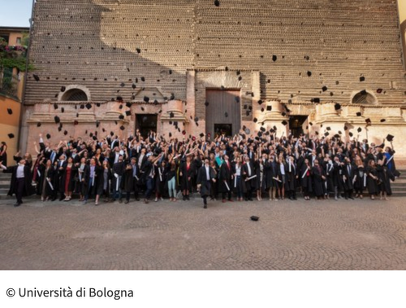
Doctoral Credits (CDs)
measure the workload of the PhD student in research activities, research training, and teaching, the three necessary tasks to obtain the doctoral degree. The PhD student must earn 60 CDs per year, corresponding to 1,500 hours of activity; each CD represents 25 hours of commitment from the PhD student. As seen in Table A, for the PhD in Chemistry, it is requested to complete 20% of training and teaching activities and 80% of research activities
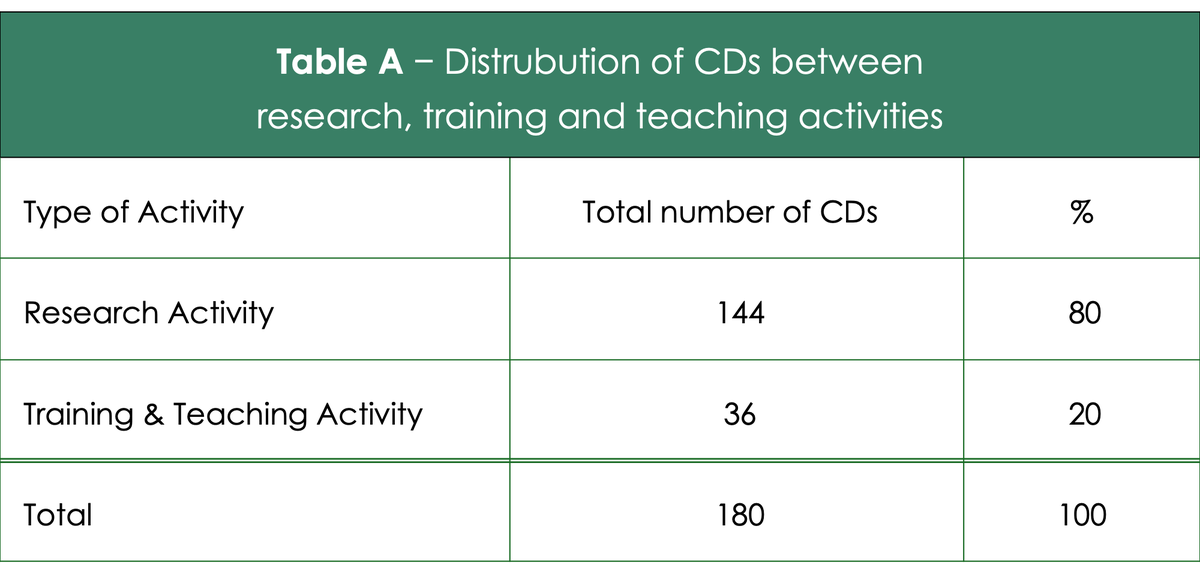
The PhD in Chemistry has established the minimum number of CDs to be earned (see Table B) for each of the following activities: a) disciplinary and multidisciplinary training, b) training in the acquisition of transferable skills, c) extracurricular training, d) dissemination, e) teaching delivery.
The activities under points a) and b) constitute the so-called curricular training. This training is organized by the PhD Program in Chemistry, the participating departments, or the university. Curricular activities may be derived from similar offerings already available within the university’s portfolio of Bachelor's and Master's degree programs. Specific curricular activities tailored for the PhD are designed to differ from undergraduate and Master's level teaching.
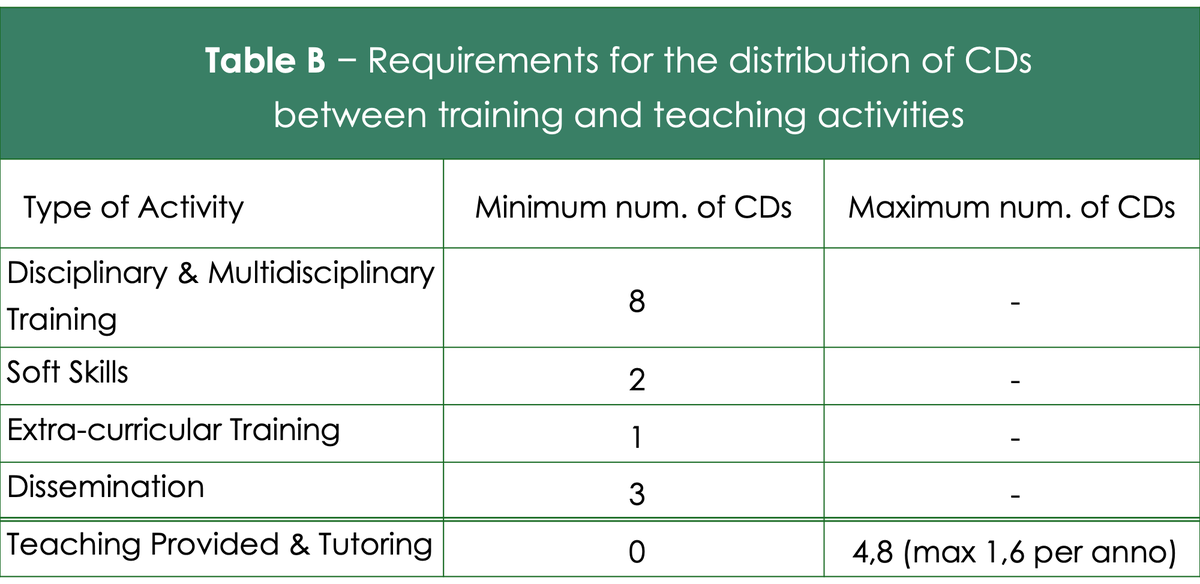
Note. The maximum number of CDs reported in the table above for "Teaching provided and tutoring" refers to non-remunerated activities.
Remunerated tutoring activities must be authorized by the PhD council (see the “vademecum” file available at the Practical Info & Forms webpage). Maximum allowed: 60h per year, which corresponds to a maximum number of 10 CDs that can be earned per year.
Non-remunerated tutoring activities (such as supervision of bachelor/master students and supervisor assistance in teaching activities) does not need authorization. Maximum allowed: 40h per year, which corresponds to a maximum of 1.6 CD that can be earned per year.
The PhD in Chemistry also sets the recommended number of CDs to be acquired for training and teaching each year (Table C), to ensure a balanced approach between these activities and research. A PhD student in deficit of CDs in relation to the annual expected total will carry over the deficit to the following year.
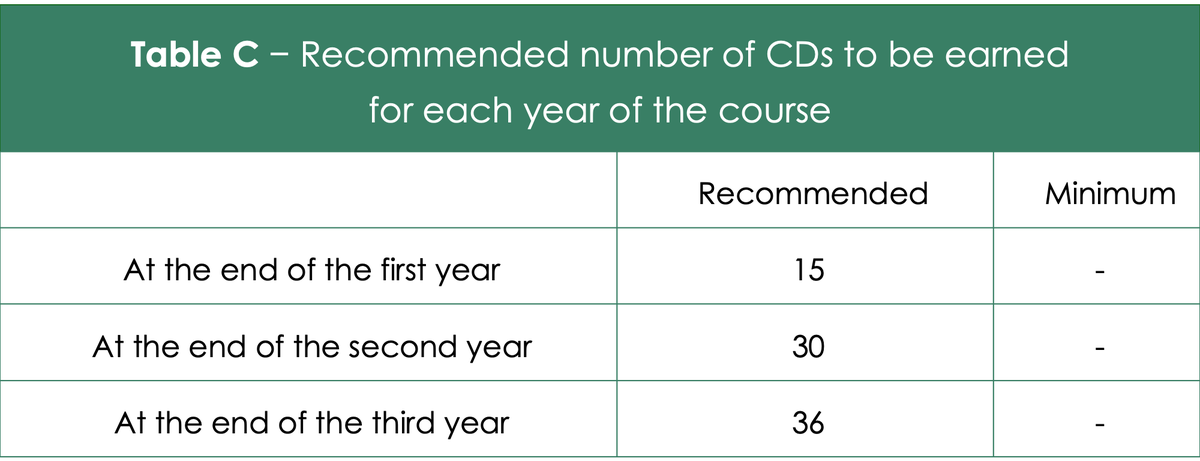
The number of CDs assigned to curricular training activities is calculated by summing lecture hours with the expected commitment for independent study. The PhD Program in Chemistry establishes its own general criteria (Table D) to determine the number of CDs to be attributed for extracurricular training and dissemination activities. For teaching and tutoring activities, the number of hours specified in the corresponding contract/record is multiplied by a factor that accounts for the preparation time.
If the activity (whether at the University of Bologna or elsewhere) involves the formal granting of a certain number of ECTS credits, then the correspondence is: 1 ECTS credit corresponds to the acquisition of 1 CD.
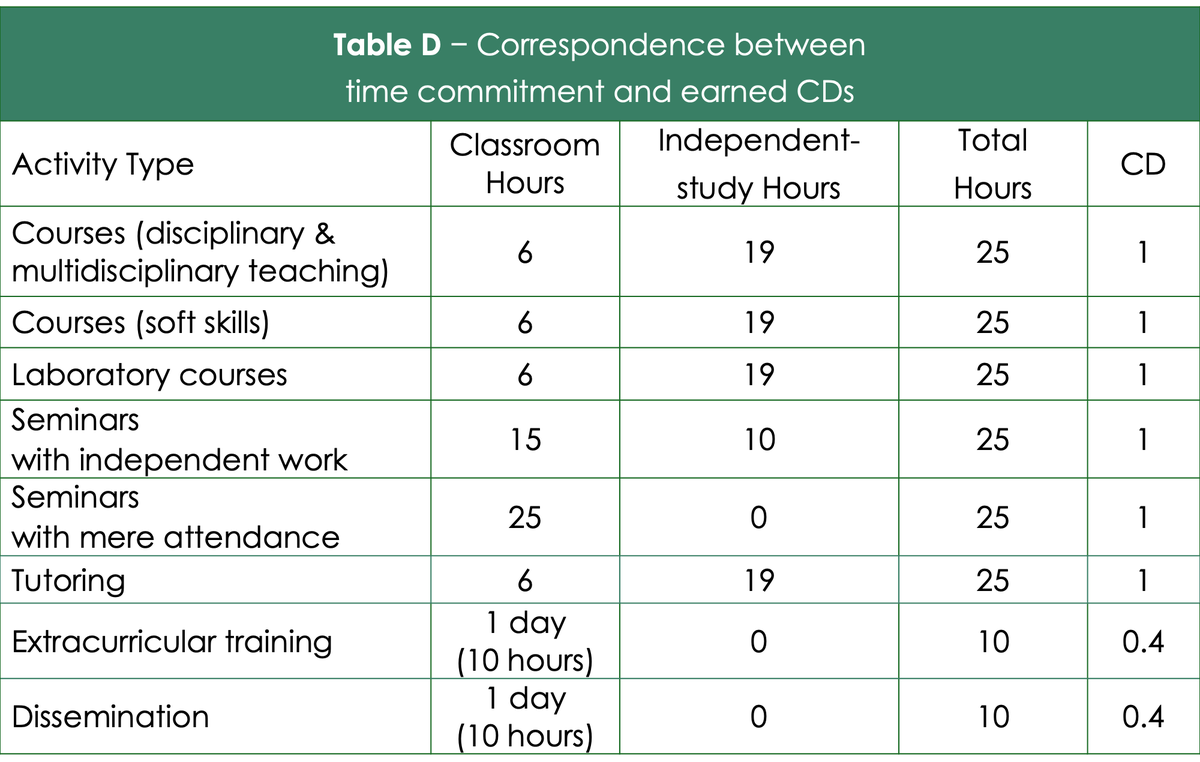
PhD students, in agreement with their supervisors and co-supervisors, define their specific research and training paths flexibly, selecting the activities to be performed in terms of type and quantity, in compliance with the constraints established by the PhD board for each activity and year of the course. PhD students can earn CDs from activities carried out both at the University of Bologna and elsewhere. Periods spent at institutions other than University of Bologna lead to the acquisition of CDs based on the type of activity performed (research, disciplinary training, transferable skills training, etc.).
The acquisition of CDs is verified during the transition to the next year. PhD students who, at the end of their doctoral program, have acquired more CDs for training and teaching than those indicated in Table A will have these excess CDs recognized beyond the theoretical total of 180. The PhD board might require individual PhD students to acquire additional CDs if these are necessary to complete their preparation in fields essential to their research projects.
The allocation of CDs for research activities is based on an assessment of the research conducted and the results achieved (particularly the research outputs included in the University’s Catalog of Publications), taking into account the supervisor's and co-supervisor's opinions. CDs for research activities are formally assigned at the time of admission to the final exam.
What are research activities?
The research activity for a student enrolled in the PhD Program in Chemistry at the University of Bologna is a rich and multifaceted journey aimed at developing both technical skills and the researcher’s capacity for autonomy and innovation.
This process unfolds through various phases and tools that contribute to the personal, scientific, and professional growth of the PhD student.
1) Definition of the Research Project. At the beginning of the program, PhD students, in collaboration with their supervisor, identify an innovative and relevant research topic in the field of chemistry. This project is almost always linked to the ongoing research lines within the research group, often funded by public or private entities.
2) Technical and Theoretical Training. The PhD student participates in advanced courses, seminars, workshops, summer schools, and conferences, both national and international – all activities that are part of the recognized academic credits for the PhD student – to deepen the specific knowledge required for their project. This continuous training allows the acquisition of state-of-the-art skills in international research.
3) Experimentation and Data Collection. A significant part of the PhD student’s work is conducted in the laboratory, where experiments are performed, data are collected, and results are analyzed. This phase requires scientific rigor and problem-solving skills to overcome technical difficulties, competencies that are part of the PhD student's training. Data Analysis and Interpretation. The obtained results are analyzed using statistical and computational methods. The PhD student must develop critical skills to interpret the data meaningfully and draw valid conclusions. Growth and Autonomy. The growth and autonomy of the PhD student are stimulated through various tools and activities.
4) Mentorship and Supervision. The supervisor’s role is crucial in guiding the PhD student, providing continuous feedback and technical support. Over time, the PhD student gains greater independence in conducting research.
5) Participation in Scientific Community Events. Conferences and Symposia: Presenting their results in international contexts allows the PhD student to engage with field experts, receive feedback, and establish collaborations. Workshops and Summer Schools: These events offer intensive training opportunities on specific topics and promote interaction with other researchers. Interdisciplinary Collaborations: Working with other research groups, even from different disciplinary fields, enriches the knowledge base and stimulates innovation. This context also includes a required period at a foreign research institution within the three-year program.
6) Expected Outcomes and Products. The main outcomes and products expected from a PhD student’s activities include:
PhD Thesis: A comprehensive document detailing the research project, methods used, results obtained, and conclusions drawn.
Scientific Articles: Publication of results in peer-reviewed journals, contributing to the advancement of knowledge in the field of chemistry.
Patents: In the case of applied research, the PhD student may contribute to the development of new prototypes or patentable technologies.
Creation of Spin-off Companies: In certain cases, when prospects related to the exploitation of intellectual property suggest it, the PhD student may participate in the creation of spin-off companies.
Intellectual Property Protection: Intellectual property protection, as mentioned earlier, is a crucial aspect of the PhD student's research work in Chemistry, which is the reason why a mandatory training course on this subject is provided. The University of Bologna provides legal and administrative support for managing intellectual property, both through patent filing and drafting confidentiality agreements with industrial partners to protect sensitive information.
In conclusion, the research activities of a PhD student in Chemistry at the University of Bologna are a rich and articulated journey that fosters scientific and personal growth, stimulates autonomy, and contributes to the advancement of knowledge in the field, with the support of an international scientific community and effective tools for intellectual property protection.
Training and Courses
The student enrolled in the PhD program in Chemistry at the University of Bologna will undergo a research training during their three-year journey, comprising various essential parts for their academic and professional development. This training program is structured to provide comprehensive and in-depth preparation, enabling the doctoral student to acquire the necessary skills to become an autonomous and highly qualified researcher. Training activities offered by the PhD program in Chemistry (or other related doctoral programs) are essential to ensure a solid theoretical and practical foundation. The courses offered by the PhD program in Chemistry are divided into different categories to cover all the main areas of chemistry. The specific courses are dedicated to the main scientific sectors of interest, such as Analytical Chemistry, Physical Chemistry, Inorganic Chemistry, and Organic Chemistry. These courses allow students to deepen their knowledge in their respective fields of specialization. In addition to specific courses, soft skills courses are also offered, including an in-depth pathway for intellectual property management and the creation of spin-off companies, as well as topics such as scientific communication and current trends in the field of chemistry, to prepare students to effectively communicate their research results to a broader audience. Furthermore, courses aimed at greater awareness and competent use of the shared instrumentation available in the departments affiliated with the PhD program in Chemistry are proposed. These courses are fundamental to ensure that students can make the best use of the available technical and instrumental resources, thus improving the quality of their research.
In addition to the specific activities of the doctoral program, students are encouraged to participate in further training opportunities offered by the University of Bologna and other research entities in the Bologna area. These activities may include courses, workshops, conferences, and seminars covering a wide range of scientific and interdisciplinary topics. Participation in these activities allows students to broaden their knowledge, connect with other researchers and professionals in the field, and stay updated on the latest scientific and technological developments.
Participation in seminars is a crucial aspect of doctoral training. Seminars offer a unique opportunity to listen to and interact with experts in the field, both national and international, who present their latest research and discuss emerging trends in the field of chemistry. These events can include presentations of research results, discussions on innovative methodologies, and debates on current issues concerning the scientific community. Attending seminars and seminar cycles allows students to confront different perspectives, stimulate critical thinking, and develop new ideas for their research. Additionally, seminars foster the creation of a professional network that can be valuable for the future career development of doctoral students.
The courses offered by the PhD school of Chemistry can be found here at dedicated webpage.